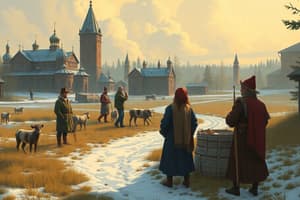Podcast
Questions and Answers
What was the major aim of the agrarian reform initiated by the Russian regime after 1905?
What was the major aim of the agrarian reform initiated by the Russian regime after 1905?
- To reinstate the mir as the primary means of rural stability
- To eliminate all forms of land ownership among peasants
- To create a class of small independent farmers (correct)
- To promote large-scale collectivization of farms
How did Lenin perceive the liberal politicians emerging after the 1905 revolution?
How did Lenin perceive the liberal politicians emerging after the 1905 revolution?
- As potential negotiators with the regime
- As allies in achieving revolutionary goals
- As self-important and ineffective (correct)
- As competent leaders of political reform
What consequence did the regime expect from encouraging peasants to consolidate their holdings?
What consequence did the regime expect from encouraging peasants to consolidate their holdings?
- Peasants would resist and not sell their land
- Peasants would unite against the regime
- Poor peasants would remain in rural areas
- Wealthy peasants would become more conservative (correct)
What was a predominant attitude among the revolutionary intelligentsia following the 1905 revolution?
What was a predominant attitude among the revolutionary intelligentsia following the 1905 revolution?
What was a notable scandal in European Social Democracy between 1905 and 1917?
What was a notable scandal in European Social Democracy between 1905 and 1917?
How did the regime view the peasants' response to the reforms initiated post-1905?
How did the regime view the peasants' response to the reforms initiated post-1905?
What was a critical point of concern for Lenin and other revolutionaries after the 1905 uprising?
What was a critical point of concern for Lenin and other revolutionaries after the 1905 uprising?
What aspect of the peasant policy was considered by the regime to provide better stability in rural areas?
What aspect of the peasant policy was considered by the regime to provide better stability in rural areas?
What was the primary task of the Russian intelligentsia in the nineteenth century?
What was the primary task of the Russian intelligentsia in the nineteenth century?
Which ideology did the Russian intelligentsia generally accept as desirable for social organization?
Which ideology did the Russian intelligentsia generally accept as desirable for social organization?
What was one of the central concerns of the Populists regarding capitalist industrialization?
What was one of the central concerns of the Populists regarding capitalist industrialization?
How did the Populists view the Russian peasantry?
How did the Populists view the Russian peasantry?
What was a significant reaction of the intelligentsia to their social isolation?
What was a significant reaction of the intelligentsia to their social isolation?
What label was retrospectively assigned to radical intellectuals who opposed capitalist industrialization?
What label was retrospectively assigned to radical intellectuals who opposed capitalist industrialization?
What did the Russian intellectuals generally believe about Western European industry?
What did the Russian intellectuals generally believe about Western European industry?
What perception characterized the impact of capitalism on traditional rural communities, as expressed by the Populists?
What perception characterized the impact of capitalism on traditional rural communities, as expressed by the Populists?
Which of the following was a consequence of the Stolypin reforms for the Russian peasantry?
Which of the following was a consequence of the Stolypin reforms for the Russian peasantry?
What was a significant economic event in Russia prior to 1914?
What was a significant economic event in Russia prior to 1914?
What was a primary concern of Lenin regarding the Stolypin reforms?
What was a primary concern of Lenin regarding the Stolypin reforms?
What pattern was observed in labor unrest following the revolutionary movement of 1905-6?
What pattern was observed in labor unrest following the revolutionary movement of 1905-6?
Which statement best reflects the political climate of Russia leading up to World War I?
Which statement best reflects the political climate of Russia leading up to World War I?
What was a notable event during the prewar years that highlighted labor unrest in Russia?
What was a notable event during the prewar years that highlighted labor unrest in Russia?
How did the Bolsheviks view the changes in worker support during the early 20th century?
How did the Bolsheviks view the changes in worker support during the early 20th century?
What aspect of Stolypin's reforms was viewed as progressive in Marxist terms?
What aspect of Stolypin's reforms was viewed as progressive in Marxist terms?
Flashcards
1905 Revolution Impact
1905 Revolution Impact
The 1905 revolution exposed limitations in revolutionary leadership's ability to guide the workers and challenged expectations of immediate societal transformation.
Bolsheviks & Mensheviks in 1905
Bolsheviks & Mensheviks in 1905
Both Bolsheviks and Mensheviks held minimal influence on the 1905 workers' revolution; the workers exceeded their leadership's expectations.
Revolutionary Leaders' Disillusionment
Revolutionary Leaders' Disillusionment
Revolutionaries were disheartened amidst the return to pre-revolutionary conditions, emigration, petty bickering among revolutionaries, and the failure to achieve social perfection.
Stolypin's Agrarian Reform
Stolypin's Agrarian Reform
Signup and view all the flashcards
Mir System Abandonment
Mir System Abandonment
Signup and view all the flashcards
Liberal Politicians' View
Liberal Politicians' View
Signup and view all the flashcards
Emigre Tensions
Emigre Tensions
Signup and view all the flashcards
Peasant Revolts Impact
Peasant Revolts Impact
Signup and view all the flashcards
Stolypin Reforms
Stolypin Reforms
Signup and view all the flashcards
Russian Peasantry's tendency
Russian Peasantry's tendency
Signup and view all the flashcards
1906 Russian Economy Boost
1906 Russian Economy Boost
Signup and view all the flashcards
Worker Labour Unrest
Worker Labour Unrest
Signup and view all the flashcards
1914 Petrograd General Strike
1914 Petrograd General Strike
Signup and view all the flashcards
Worker Grievances
Worker Grievances
Signup and view all the flashcards
Mensheviks and Bolsheviks
Mensheviks and Bolsheviks
Signup and view all the flashcards
Russian Industrial Expansion
Russian Industrial Expansion
Signup and view all the flashcards
Russian Intelligentsia's Goal
Russian Intelligentsia's Goal
Signup and view all the flashcards
Western Europe's Influence
Western Europe's Influence
Signup and view all the flashcards
Populism: A Russian Radical Thought
Populism: A Russian Radical Thought
Signup and view all the flashcards
Populism: A Label with Nuance
Populism: A Label with Nuance
Signup and view all the flashcards
Socialism as a Desired Ideal
Socialism as a Desired Ideal
Signup and view all the flashcards
Bridging the Gap: Intelligentsia and 'The People'
Bridging the Gap: Intelligentsia and 'The People'
Signup and view all the flashcards
Populism: Idealization of the Russian Peasantry
Populism: Idealization of the Russian Peasantry
Signup and view all the flashcards
Capitalism's Impact on Rural Communities
Capitalism's Impact on Rural Communities
Signup and view all the flashcards
Study Notes
Book Title: The Russian Revolution, Second Edition
- Author: Sheila Fitzpatrick
- Publisher: Oxford University Press
- Book details about the author and her academic publications
- Fitzpatrick is a Professor of Modern Russian History at the University of Chicago.
- Her scholarship focuses on modern Russian and Soviet social, political, and cultural history, from 1917 to 1953.
- Her publications include The Cultural Front: Power and Culture in Revolutionary Russia (1992) and Everyday Stalinism (Oxford University Press, 2000).
Contents
- Acknowledgements
- Introduction
- The Setting
- The society
- The revolutionary tradition
- The 1905 Revolution and its aftermath; the First World War
- 1917: The Revolutions of February and October
- The February Revolution and 'dual power'
- The Bolsheviks
- The popular revolution
- The political crises of the summer
- The October Revolution
- The Civil War
- The Civil War, the Red Army and the Cheka
- War Communism
- Visions of the new world
- The Bolsheviks in power
- NEP and the Future of the Revolution
- The discipline of retreat
- The problem of bureaucracy
- The leadership struggle
- Building socialism in one country
- Stalin's Revolution
- Stalin versus the Right
- The industrialization drive
- Collectivization
- Cultural Revolution
- Ending the Revolution
- Ending the Revolution
- 'Revolution accomplished'
- 'Revolution betrayed'
- Terror
- Notes; Select Bibliography
- Index
Studying That Suits You
Use AI to generate personalized quizzes and flashcards to suit your learning preferences.





